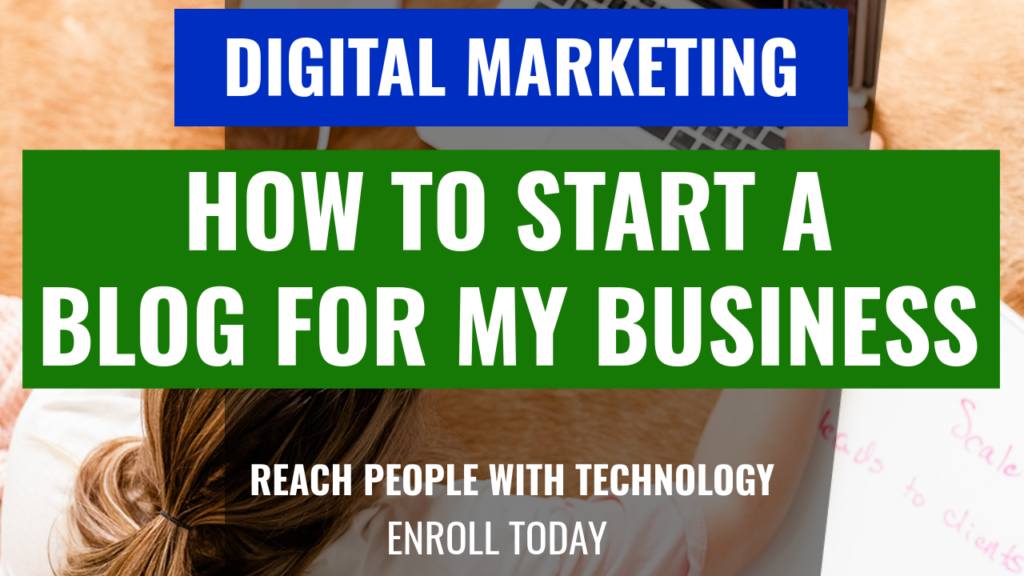Are you searching the internet for How to start a blog for my business? You have come to the right blog. In this article we are going to cover some simple steps on how you can start a blog for your business.

It’s hard to stand out in such a crowded digital space. Everyone is trying to make a name for themselves, and it can feel impossible to get noticed.
You’re pouring all of this time and energy into your business, but it’s not getting the attention it deserves. You know you have something valuable to offer, but nobody seems to be paying attention.
Starting a blog is a great way to differentiate yourself from the competition and establish yourself as an authority in your industry.
With our step-by-step guide, you’ll have all the tools you need to create a successful blog and increase your online presence.
We’ll walk you through everything from choosing a platform to creating content that resonates with your target audience.
Don’t let your business get lost in the digital noise – start your blog today and take your online presence to the next level.
A Step-by-Step Guide on How to Start a Blog for Your Business and Increase Your Online Presence.
Blogging has become an essential tool for businesses to increase their online presence and reach a wider audience.
Whether you're a small business owner or the marketing manager of a large corporation, starting a blog can help you establish your brand as an authority in your industry.
It can also help you connect with your audience, build relationships, and ultimately increase sales. But where do you start?
In this step-by-step guide, we'll walk you through everything you need to know to start a blog for your business.
From choosing a platform and a domain name to creating content and promoting your blog, we've got you covered.
So if you're ready to take your online presence to the next level, read on to learn how to start a blog for your business.
1. Define your blog's purpose and goals
Before starting a blog for your business, it's important to define its purpose and goals. Ask yourself, what do you want to achieve with your blog?
Do you want to increase brand awareness, drive traffic to your website, or generate leads? Once you have a clear understanding of your goals, you can design your blog to meet those objectives.
The next step is to define your target audience. Who are you writing for? What are their interests and what type of content are they looking for?
Understanding your audience is crucial to creating content that resonates with them and keeps them engaged. It's also important to decide on the tone and voice of your blog.
Will it be formal or informal?
Will it be serious or lighthearted?
This will depend on your brand and the type of content you're creating. Finally, you should consider the frequency and consistency of your blog posts.
How often will you be posting? Will it be weekly or monthly?
Consistency is key when it comes to blogging, so it's important to establish a posting schedule and stick to it.
By defining your blog's purpose and goals, identifying your target audience, establishing a tone and voice, and creating a posting schedule, you can ensure that your blog is effective in achieving your business objectives and increasing your online presence.
2. Choose a platform and domain name
Choosing the right platform and domain name is critical when starting a blog for your business. The platform you use will determine how easy it is to create and manage your blog.
There are many blogging platforms available, each with its own set of features. Some popular platforms include WordPress, Squarespace, and Wix.
WordPress is the most popular platform for blogs because it is free, easy to use, and has a wide range of features.
Squarespace and Wix are both paid platforms that offer drag-and-drop website builders, making it easy to create a professional-looking blog without any coding experience.
Once you have chosen a platform, you need to choose a domain name. Your domain name will be the address people type into their browser to find your blog.
It is important to choose a domain name that is easy to remember and reflects your business. You can use your business name or choose a name that reflects what your blog is about.
When choosing a domain name, it is important to make sure it is available. You can check for domain name availability on websites like GoDaddy or Namecheap.
In summary, choosing the right platform and domain name is an important first step in starting a blog for your business.
Make sure to choose a platform that meets your needs and a domain name that is easy to remember and reflects your business.
With these in place, you'll be on your way to creating a successful blog that will help increase your online presence.
3. Design your blog and create content
Once you have chosen a blogging platform, it's time to design your blog and start creating content.
The design of your blog should be visually appealing and reflect the tone and style of your brand. You can choose from a variety of free or paid themes that will give your blog a professional look.
When creating content, it's important to keep your audience in mind. Think about what topics they might be interested in and what questions they might have.
You should also consider the tone and style of your brand when creating content. Will your blog be informative, educational, or entertaining?
Once you have a clear idea of your audience and the tone of your blog, you can start creating content.
When creating content, it's important to be consistent. Aim to post at least once a week, but don't sacrifice quality for quantity. Your blog posts should be well-written, informative, and engaging.
You can also include images and videos to make your content more visually appealing. Finally, don't forget to promote your blog.
Share your blog posts on social media platforms like Facebook, Twitter, and LinkedIn. You can also send your blog posts to your email subscribers or include them in your newsletters.
By promoting your blog, you'll increase your online presence and attract more readers to your website.
4. Promote your blog and measure success.
Once you have your blog up and running, it's time to start promoting it and measuring its success. The first step is to make sure that your blog is easily accessible on your website.
Make sure that there is a link to your blog on your website's homepage, and consider adding a banner or call-to-action to encourage visitors to check out your blog. Social media is also a powerful tool for promoting your blog.
Share your blog posts on your social media channels and encourage your followers to read and share them.
You can also reach out to other bloggers in your industry and collaborate on guest posts or link exchanges.
This will help to increase your blog's exposure to a wider audience. Measuring the success of your blog is important to understand what content is resonating with your audience.
You can use tools like Google Analytics to track your blog's traffic and engagement metrics.
This will help you to identify which blog posts are most popular and what topics your audience is most interested in.
You can also use social media analytics to track how many shares, likes, and comments your blog posts are receiving on social media.
This will give you insight into which social media channels are most effective in promoting your blog.
In conclusion, promoting and measuring the success of your blog is crucial to growing your online presence.
By regularly promoting your blog on your website and social media channels, collaborating with other bloggers, and tracking your blog's traffic and engagement, you can increase your online visibility and build a loyal audience for your business.
Conclusion:
We hope that our step-by-step guide has provided you with a clear roadmap for starting your own business blog.
Remember, the key to success is to consistently create high-quality content that provides value to your readers.
With a little persistence and creativity, you can build a successful blog that helps you achieve your business goals.
If you have any questions or need additional support, please don't hesitate to reach out to us by leaving a comment in the comment section below.
